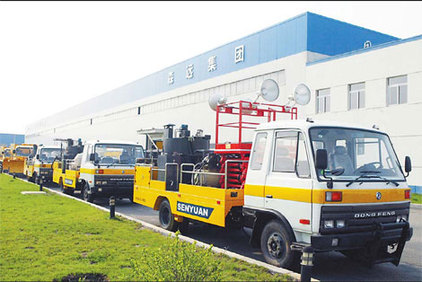
|
REGIONAL> Profiles
 |
|
Roadmaster
By YU TIANYU (China Daily)
Updated: 2008-08-29 17:05
 Guo Songsen, chairman of Anshan Senyuan Road and Bridge Co Ltd in Liaoning province, is a typical northeastern man with a powerful frame, chubby face and deep eyes, who speaks with a deep, grave voice. Unlike business leaders people have seen before, Guo looks like a strict school headmaster or a poker-faced government officer with deep wrinkles between very dark eyebrows. Indeed, he was. Guo used to be an official of the Organization Department at the Anshan Committee of the Communist Party of China (CPC), a position with potential for a promising future. It is a study in contrast to see Guo in his spacious, grimy industrial factory buildings still dressed like a government official in a pressed white shirt, expensive tie and black and blue striped jacket. Guo's life has changed tremendously since he left a secure government career to become a leading force in China's road maintenance machine manufacturing sector. He's also a courteous man, frequently bowing when talking with people, not only to his business partners, but also his staff. His company, Senyuan, is a private enterprise in Anshan city that produces road repair machines, road maintenance machines, asphalt makers and snowplows. Senyuan independently developed China's first asphalt recycling and road repair machine in 2000, and also world's first discharged asphalt and mixed material recycling and road repair machine in 2003. Its products are in line with China's energy saving and emissions reduction policy, and have been sold to more than 20 provinces and cities in the nation. With more than 520 staff and 230 million yuan in fixed assets, its sales revenue reached 495 million yuan in 2007, up 41 percent year on year. In contrast to his former life as a government bureaucrat, now Guo is occupied with phone calls, meetings, negotiations, media interviews and many other responsibilities he never touched before. "As a leader of such a promising enterprise, many people praise me for my accuracy, keenness of judgment and insight, but actually it was not like that, " says Guo. "The era pushed, encouraged me and made me successful. " Times make heroes In the mid-1980s, a few adventurous civil servants tried to spread their career wings by working at some State-owned enterprises as the country was beginning to open up. In the 1990s, their time seemed nearer after then-leader Deng Xiaoping made his famous southern tour and inaugurated the market reform process. The government followed suit by initiating supportive policies that allowed officials and civil servants to go into business on their own in a movement that the Chinese dubbed "going to sea". Government departments at all levels were also being reformed, reshuffled, reduced and by 1999 city, headcounts in county and village governments throughout China were reduced by about 2.8 million people. Along with the enforcement of Provisional Regulations of the People's Republic of China on Private Enterprises in 2000, civil servants becoming private entrepreneurs had become a trend in China. Guo was one of those pioneers. "I feel lucky that I overcame that tough period," he says. Guo never worked as a factory worker or an enterprise manager after graduating from university. His official career looked bright as an officer at Anshan Municipal Bureau of Personnel to a position as an official of the Organization Department of CPC Anshan Committee. He recalls that at the time people said China doesn't need more provincial governors and mayors, but instead it need good entrepreneurs. This opinion inspired Guo and despite the reservations of his family in 1992 at age 29, he left his seven-year civil service position and struck out on his own. He did have a fallback plan, however. "If the business failed, we were allowed to go back working at our previous positions," Guo says. "But as for me, I wanted to take risks and take the hard way." |